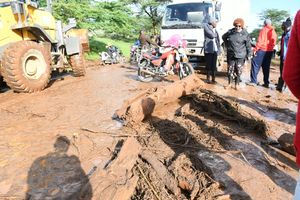It is pointless to shut coronavirus hotspots, experts say

What you need to know:
- Dr Nanyingi said lockdown is not an antidote and may defeat the purpose despite the surging numbers of positive cases.
- He noted that this could have been slowed down by the previous lockdown, but it may be a little late.
As President Uhuru Kenyatta weighs his options ahead of a crisis meeting on Covid-19 on Friday, experts say it is pointless to lock down virus hostpots at this point.
In an interview with K24 TV, Dr Mark Nanyingi, an infectious disease epidemiologist, said lockdown is not an antidote and may defeat the purpose despite the surging numbers of positive cases.
“Currently, there is a sustained community transmission of Covid-19, which needs to be disrupted,” he said.
He noted that this could have been slowed down by the previous lockdown, but it may be a little late.
INCUBATING DISEASE MORE
“Putting on another lockdown will not make any sense. This is because we will be incubating the disease more,” he said, arguing that it will be like trying “to create a reset button”.
This may worsen the situation, Dr Nanyingi said, considering that an entire population will be locked down while on the other hand there will be international travel, which is expected to begin on August 15.
According to the expert, lockdowns are only important if there are measures being put in place.
These include having infection prevention controls such as providing personal protective equipment and training of healthcare workers on how to handle highly infectious diseases like Covid-19.
NOT FEASIBLE
“Unless we have a robust public health system and have prepared the lower hospitals to have proper capacity to hospitalise and treat severe cases, lockdowns are not feasible.
“I will not advocate for lockdown unless within the last two weeks we have done very well in putting measures in place,” he said.
According to Dr Nanyingi, should the government choose a lockdown, it should be on a case-by-case basis; say a lockdown of a particular area.
His sentiments were echoed by Dr Githinji Gitahi, the Group Chief Executive Officer of Amref Health Africa.
Dr Gitahi said: “A general lockdown will not be of any use at all unless it is being done for a particular purpose of preparedness. I don’t think it is needed unless we have an assessment, where we establish gaps that need to be filled.”
STAY AT HOME
According to Dr Gitahi, the government may institute a reverse lockdown or isolation, where the people at risk are asked to stay at home.
“Lockdown will only be useful if there is a specific reason,” he said, adding that the government should instead focus on preventing deaths and infection among vulnerable populations such as those who are diabetic, obese or the old.
“The focus should be on shielding vulnerable populations from the disease. These groups can be identified through local administration and community leaders, said Dr Githinji.
The measures can also be localised, where vulnerable employees can identify themselves and undertake reverse isolation (work from home).
“The focus should be on proper medical response for people who need it,” said Dr Gitahi.
Unfortunately, many people have medical conditions that they may not be aware of, for example hypertension and diabetes, he added.
CONTACT TRACING
“Lockdown is essentially the principal of flattening the curve because it helps reduce the number of infections and the government ought to have maintained the standard protocol of test, trace and isolate,” said Dr Nanyingi.
He noted that it was too early for the government to lift lockdown measures that it had put earlier.
“The biggest question is, have we lowered the number of cases? The answer is No,” he said.
He said the country’s health capacity may not be able to accommodate the increasing number of Covid-19 cases, in addition to the fact that deaths are also increasing every day.
He said tests have not been ramped up so as to determine the sick, especially those who are asymptomatic and to carry out proper contact tracing.
NO DOWNWARD TRAJECTORY
“We have not seen evidence of a downward trajectory of the number of Covid-19 cases. You need about two weeks of no documented cases or any deaths to lift a lockdown. But so far, we are seeing cases spiking,” he said.
Dr Nanyingi said before the government takes any action, there should be evidence that should inform the measures being undertaken.
He warned that herd immunity is not a strategy that should be entertained because it is an outcome of a disease process.
“It might be unethical to advocate for intentional allowing of the disease to take its course. That means you will allow more people to get sick, which is a calamity,” said Dr Nanyingi.
Herd immunity is usually created when 60 per cent of the entire population has been exposed to an infectious disease. Unfortunately, there are so many unknown cases and it should thus not be considered as a way of protecting people,” he said.
“The most critical part is that we cannot abandon testing. This is the only way that can explain to us or give us a picture of how far the disease has spread.”
The epidemiologist called on the government to recruit more healthcare workers, undertake capacity building, increase control mechanisms and ramp up testing capacity.





